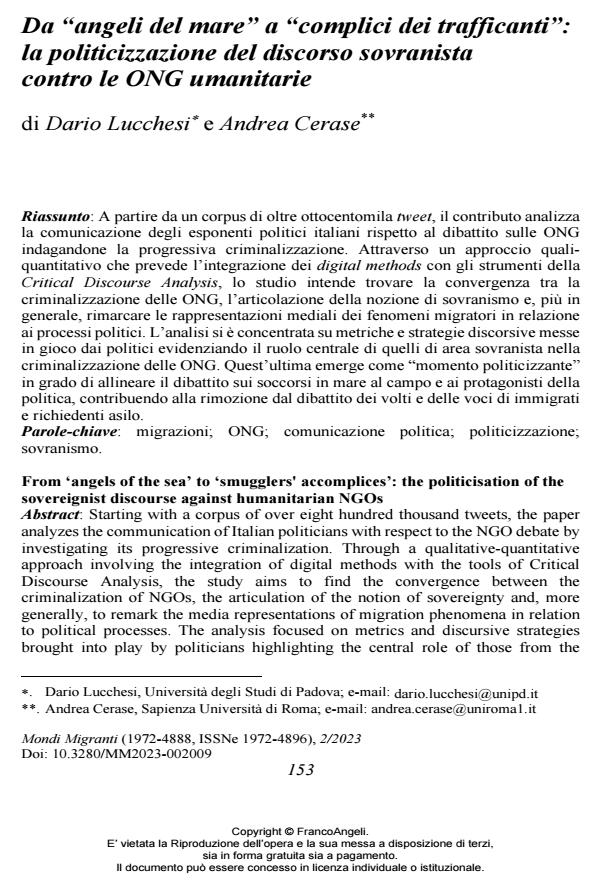Da "angeli del mare" a "complici dei trafficanti": la politicizzazione del discorso sovranista contro le ONG umanitarie
Titolo Rivista MONDI MIGRANTI
Autori/Curatori Dario Lucchesi, Andrea Cerase
Anno di pubblicazione 2023 Fascicolo 2023/2
Lingua Italiano Numero pagine 38 P. 153-190 Dimensione file 358 KB
DOI 10.3280/MM2023-002009
Il DOI è il codice a barre della proprietà intellettuale: per saperne di più
clicca qui
Qui sotto puoi vedere in anteprima la prima pagina di questo articolo.
Se questo articolo ti interessa, lo puoi acquistare (e scaricare in formato pdf) seguendo le facili indicazioni per acquistare il download credit. Acquista Download Credits per scaricare questo Articolo in formato PDF

FrancoAngeli è membro della Publishers International Linking Association, Inc (PILA), associazione indipendente e non profit per facilitare (attraverso i servizi tecnologici implementati da CrossRef.org) l’accesso degli studiosi ai contenuti digitali nelle pubblicazioni professionali e scientifiche.
A partire da un corpus di oltre ottocentomila tweet, il contributo analizza la comunicazione degli esponenti politici italiani rispetto al dibattito sulle ONG indagandone la progressiva criminalizzazione. Attraverso un approccio quali-quantitativo che prevede l’integrazione dei digital methods con gli strumenti della Critical Discourse Analysis, lo studio intende trovare la convergenza tra la criminalizzazione delle ONG, l’articolazione della nozione di sovranismo e, più in generale, rimarcare le rappresentazioni mediali dei fenomeni migratori in relazione ai processi politici. L’analisi si è concentrata su metriche e strategie discorsive messe in gioco dai politici evidenziando il ruolo centrale di quelli di area sovranista nella criminalizzazione delle ONG. Quest’ultima emerge come “momento politicizzante” in grado di allineare il dibattito sui soccorsi in mare al campo e ai protagonisti della politica, contribuendo alla rimozione dal dibattito dei volti e delle voci di immigrati e richiedenti asilo.
Parole chiave:migrazioni; ONG; comunicazione politica; politicizzazione; sovranismo.
- The populist far right paradox: the identification of the enemy and its exceptions in the immigration policies of the Meloni government in Italy Maurizio Ambrosini, in Comparative Migration Studies 17/2025
DOI: 10.1186/s40878-025-00438-y - When Good is Called Evil: How Italian Right-Wing populist Politicians Normalise the Stigmatisation of Non-Governmental Organisations Enzo Loner, Rosa Sanchez Salgado, Carlo Berti, in The Communication Review /2026 pp.22
DOI: 10.1080/10714421.2025.2461930 - Il Mediterraneo Centrale come campo di battaglia: diario etnografico di un imbarco con la Civil Fleet Roberta Derosas, Luca Queirolo Palmas, in MONDI MIGRANTI 3/2025 pp.119
DOI: 10.3280/MM2025-003006 - The Palgrave Handbook on Right-Wing Populism and Otherness in Global Perspective Dario Lucchesi, pp.297 (ISBN:978-3-031-77867-4)
Dario Lucchesi, Andrea Cerase, Da "angeli del mare" a "complici dei trafficanti": la politicizzazione del discorso sovranista contro le ONG umanitarie in "MONDI MIGRANTI" 2/2023, pp 153-190, DOI: 10.3280/MM2023-002009